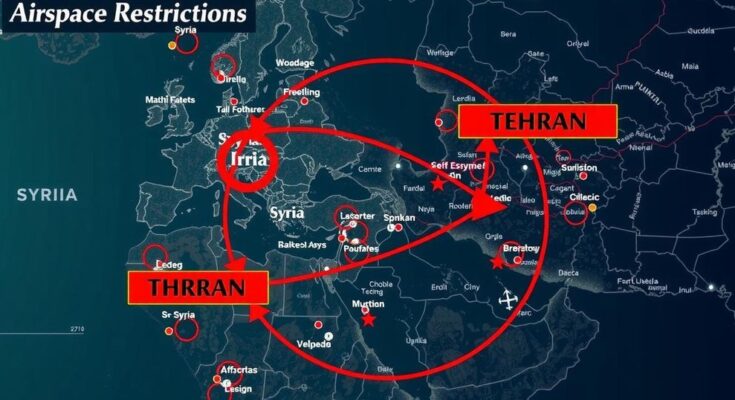In response to Israeli airstrikes on Iran, Syria, Iraq, and Tehran have closed their airspaces to all flights. The closure affects all civilian and military flights indefinitely. Israel’s air assaults targeted Iranian military sites across various provinces, which Iran claims caused limited damage. Iranian forces assert successful interceptions of the attacks, urging citizens to remain cautious against misinformation.
In response to a series of intensified airstrikes by Israel targeting facilities within Iran, the governments of Syria, Iraq, and Tehran have enacted a comprehensive closure of their airspaces to all flights. This significant action, aimed at safeguarding air traffic in light of escalating geopolitical tensions, extends to civilian, commercial, and non-operational military flights and is set to remain in effect through at least Saturday morning. Although Iran initially intended to reopen its airspace at 9 AM, this has been subsequently extended indefinitely due to the ongoing situation. Israel’s military confirmed the execution of direct airstrikes against Iranian missile production facilities and aerial defense systems. Reports from Israel’s public broadcaster indicate that these operations comprised three waves of strikes directed towards various locations across Iran. Responses from Iranian air defense systems indicated an engagement with the attacks, asserting that Israel targeted military installations in the provinces of Tehran, Khuzestan, and Ilam, and reported “limited damage” sustained in certain areas. The Iranian Air Defence Forces described the assaults as aggressive maneuvers by Israel, which they classified as an affront to their sovereignty. In their public statement, the Air Defence Forces articulated, “Despite previous warnings by the Islamic Republic of Iran to the criminal and illegitimate Zionist regime to avoid any adventurous actions, this fake regime attacked parts of military installations in Tehran, Khuzestan and Ilam provinces this morning.” They noted that their integrated air defense systems played a crucial role in intercepting the Israeli strikes, managing to contain the extent of the damage, which is currently under investigation. The Iranian government has urged its citizens to maintain calm and solidarity during this tumultuous period, advising them to remain informed via national and official media channels rather than succumbing to misinformation. The closure of airspace by these Middle Eastern nations underscores the rising tensions attributed to military confrontations that could potentially escalate into a broader regional conflict. This situation has raised concerns not only for the nations directly involved but also for international stakeholders, including the United States, which may be drawn into the fray of escalating hostilities.
The recent military engagement between Israel and Iran marks a significant escalation in ongoing hostilities between the two nations, which have faced diplomatic confrontations for years, primarily stemming from Iran’s nuclear program and its support for various militant groups in the region. This particular episode was characterized by Israel’s targeting of Iranian military infrastructure, reflecting its longstanding objective to hinder Iran’s military capabilities. The subsequent reactions, including the airspace closures by Syria, Iraq, and Iran, highlight the broader regional implications of such attacks, likely drawing in other international powers and exacerbating existing hostilities in the Middle East.
The closing of airspaces by Syria, Iraq, and Iran in reaction to Israeli airstrikes illustrates a significant development in the ongoing conflict that poses risks of further military escalation in the region. The responses from Iranian authorities reveal their commitment to countering perceived threats, while also emphasizing the need for public tranquility amid rising tensions. The situation remains fluid, warranting close scrutiny by international observers as it may affect regional stability significantly.
Original Source: freepresskashmir.news




